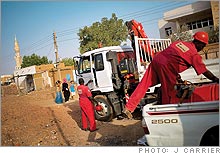A Texas company in SudanSudan has been under U.S. sanctions since 1997, so what's a Texas oil-services company doing operating within its borders? Fortune's Vivienne Walt reports.(Fortune Magazine) -- The house on a side street in Khartoum, like others in Sudan's capital, is newly built, with a wall blocking its occupants from view. But these occupants - no name outside - need more privacy than others. The red logo inside is of a major American oilfield-services company, Weatherford International, based in Houston, in a state whose legislature recently voted to divest its pension funds from companies operating in Sudan. So what's a Texas company doing renting drilling gear and other equipment in a country whose Islamic government has been under U.S. sanctions since 1997? Outraged over Darfur, Congress has also prohibited U.S. transactions with Sudan's oil industry, while President Bush has banned 30 Sudanese companies from using the U.S. financial system.
The answer is that there's a loophole big enough for a $6.5 billion company. "We report only to Dubai," said Tarek Khalil, who runs Weatherford Oil Tool Middle East in Khartoum, when Fortune visited his office in June. "We have nothing to do with the U.S." Indeed, foreign subsidiaries of U.S. companies can operate in Sudan if "there is no involvement by the U.S. parent or any other U.S. person," says Treasury spokeswoman Molly Millerwise. Why don't more companies enter the booming Sudanese market? "When people find out you're doing that, it creates a pretty bad rap for your company," says Michael Jacobson, a former Treasury official and now a fellow at the Washington Institute for Near East Policy. (Another former Treasury official, Nicholas Brady, who served as Secretary from 1988 to 1993, sits on Weatherford's board.) Weatherford (Charts) competitor Baker Hughes (Charts, Fortune 500) withdrew its foreign subsidiary from Sudan last year. "There was near unanimity and condemnation of what was going on in Sudan," says head of investor relations Gary Flaharty in Houston. "We made the decision according to that." Thirteen states have voted to pull pension funds from companies doing business in Sudan, and activists say they might target companies with subsidiaries there for divestment. "These companies have been flying under the radar until now," says Jason Miller, policy advisor to the Sudan Divestment Task Force in Washington. "They are not abiding by the spirit of the law. They know this, and if the public were made aware of it, there would be an outcry." Carine Bouery, a spokeswoman at the subsidiary's Dubai office - to which Khalil reports - told Fortune, "We can't say anything in any publication about being in Sudan. This is too sensitive." In Houston, Weatherford CFO Andy Becnel says he's aware of those sensitivities, but he insists the company abides by the law. He also acknowledges that activist pressure could force a change. "If something were really unpopular," he says, "the shareholders could request the company to no longer operate there." From the August 6, 2007 issue
|
Sponsors
|

